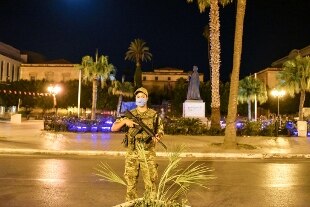Tunisia.
President freezes parliament and fires premier
Covid-19, North Africa can't make it.
Tunisia avoids health catastrophe thanks to donations
Share
July 26, 2021 The decisions to freeze Parliament for 30 days, revoke the immunity of deputies and dismiss the premier do not represent "a coup d'état", they are constitutional decisions, pursuant to Article 80 of the Constitution: he said so the Tunisian president, Kais Saied, responding to the president of the Assembly and leader of the Islamic party Ennhadha (first in parliament), Rached Ghannouchi. "Anyone who talks about a coup should read the Constitution or go back to the first year of primary school, I have been patient and I have suffered with the Tunisian people," Saie said on state TV.
For his part, Ghannouchi called his people to demonstrate in front of the classroom to "restore democracy" and stressed that he had not been informed of the decisions of the head of state, as required by art. 80 of the Constitution. Meanwhile, the first reactions of the parties arrive, which last night held summits to assess the situation. In addition to Ennhadha's obvious contrary position, who rejects Saied's decisions, his government ally, Qalb Tounes, also called the president's move "a serious violation of the Constitution and the provisions of Article 80". Tounes also called on the head of the government to assume his "legitimate" functions and not to create a vacuum in the government presidency.Observers are concerned by the fact that Saied has also decided to take over the position of Attorney General of the Republic for himself, with the right therefore to be able to prosecute. This would allow him to arrest even the deputies, once their immunity is taken away. Again according to the same sources, a ban on traveling abroad has already been ordered against Ghannouchi and 64 other deputies, who have pending cases with the justice system.a ban on travel abroad has already been announced.a ban on travel abroad has already been announced.
Thousands took to the streets against the government, President Kais Saied imposed the resignation of the premier, Hicham Mechichi, and froze Parliament for 30 days. The management of the economy and the epidemic are under accusation. There have been clashes and arrests but a part of the political class denounces the coup: "It is a coup against the revolution", accused the moderate Islamist party Ennahda. Despite the curfew, imposed between 20:00 local time and 5:00, and the restrictions of the health emergency that prohibit any kind of public demonstration, the capital experienced a festive atmosphere during the night: thousands of cars and ordinary citizens they celebrated under the gaze of the police until late at night. At one point, the president also joined the demonstrators.For several days, appeals to take to the streets have been circulating on Facebook, by unidentified groups: the ruling parties and in particular the Islamist Ennahda formation, whose offices had been targeted, were contested. The demonstrators demanded a change to the constitution and a transition period run by the army, while retaining Saied as head of state. This morning the army that is presiding over the building of the Tunisian Parliament denied access to the Speaker, Rached Ghannouchi, who presented himself at the entrance accompanied by the Vice President, Samira Chaouachi, the former Minister of Justice Noureddine Bhiri and the deputies of the Islamist parties Ennahdha and Al Karama. Ghannouchi accused the president of putting in place a "coup d'état against the revolution and the Constitution "and called the people to" defend the revolution ".
The rumors of a plan to overthrow the Tunisian government and give the president, Kais Saied, full control of the institutions, dates back to last May. On May 24, the Middle East Eye specialized portal had come into possession of a document dated May 13 and labeled as "absolutely top secret" which contained in detail the plan with which Saied, an independent with no party behind him, intended to take power , applying Chapter 80 of the Constitution, which allows him to take power in the event of a national emergency.
Tunisia began its democratic transition in 2011 with the so-called "Jasmine Revolution", which put an end to two decades of Zine El Abidine Ben Ali's dictatorship: ten years in total have succeeded ten governments that have further aggravated the situation economic and social crisis. Saied promised to heal the complex political system deteriorated by corruption. The last elections had produced a parliament in which no party held more than a quarter of the seats. Now the pandemic has precipitated the situation. Cases have risen sharply in recent weeks, putting further pressure on the already faltering economy. The premier fired the health minister last week,but this obviously was not enough to appease the anger.

